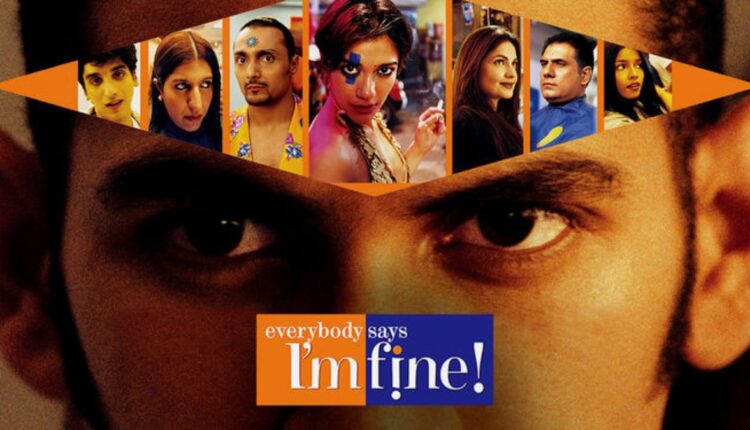Rahul Bose’s directorial debut is one of the most original works from Mumbai in a long while. Everybody Says I’m Fine gives us a slice of suburban artifice, served up with a dash of lime and spice. The characters are self-delusory creatures of the metropolitan muddle. Insistently acquisitive and obscenely inquisitive, these children of an urban diaspora make us grimace and grin, as Bose unravels the fine confusions and chaos in their heads.
The first thing that strikes us in Bose’s film is its setting. Located in a beauty salon in the heart of Mumbai city, nobody’s fine in Everybody Says I’m Fine. Bose’s characters are monstrously displaced, completely out-of-sync with the inner rhythms of their heart. Zen (Rehaan Engineer) is the salon owner, hair stylist and barber whose childhood dreams of becoming a musician went up in smoke after a recording studio caught fire.
Now the fire rages within Zen, but we don’t see the smoke as he busies himself attending to various bitchy and benign socialites, rebellious youngsters, demented careerists and twisted business persons. The only normal character in this anarchic arcadia is the cashier Monica, frowning as her gentle boss waives away payments, match-makes and matches wits with a crazed wannabe film star named Rage (played with zany pathos by the director Rahul Bose).
Bose’s cryptic, quirky, capricious world of innocence and corruption, sometimes occurring together or colliding as they converge from opposite sides, nourishes and feeds the superbly executed plot. In the best written character of Tanya, played by Pooja Bhatt, we see a deep-rooted ingenuity as well as a disarming innocence.
Some of the film’s most humane moments feature Tanya’s unmasking ceremony as the camera (brilliantly manned by Vikas Sivaraman) trails her through the streets of Mumbai to uncover the tragic truth behind her socialite’s charade. The moment when Zen rescues her from public humiliation and Tanya turns to him with gratitude and love, is revealing, not just for the character, but also for the long-neglected actress called Pooja Bhatt who builds a complete life for her character through small gestures and indecipherable nuances.
Everybody Says I’m Fine is a startling and original work. The characters, all joined at the hip and lip at the salon, are prosaic in their postures and yet almost poetic in their attitude to angst, heroic in the way they grapple with the demons in their minds, hearts and pants.
Some of the film’s most brilliant portions depict the growing fondness between the hermetic Zen and the visibly distraught wild-child Nikita (newcomer Koel Purie).
Director Bose’s eye for inner detail never wavers. He can look pain straight in the eye and still make it beautiful. He can look for the comedy underlining the Great Human Tragedy or celebrate the immensity of human grief without drowning in puddles of tears. Bose captures the pungent flavour of parlour parlez-vous. To put the lovely Tanya down, the vicious Misha (Anahita Uberoi) says, “I love what you’re wearing. It’s always been one of my favourites.”
And when the serenely sensitive Zen bails Tanya out of a tight situation by slipping in an incriminating note into a copy of Stardust, Tanya smiles, “Nowadays film magazines carry some real spicy stuff.”
The film’s power-driven, deceptively unpremeditated progression never loses track of the theme’s humanistic core. The characters are always changing, they therefore never bore. The love sequence between the troubled Zen and the super-troubled Nikita is arguably the most moving sexual encounter ever seen in an ‘Indian’ film.
That brings us to a crucial question: how Indian is Rahul Bose’s film anyway? The attitudes that the characters assume, the feelings and thoughts that they so subtly put forward are all emblematic of metropolitan mores. That Bose is awkward with the conventions of mainstream cinema becomes apparent in the film’s most unauthentic sequence where Nikita and her friend enact a Hindi film melodrama before the embarrassed and amused Zen.
Even on a spoofy level, Bose’s sensibilities are divorced from the notorious masala entertainment of Mumbai. Everybody Says I’m Fine is an inverted morality play where the people don’t abide by codes of morality but try to accommodate mores and ethics of existence into their own twisted lives.
It’s astonishing how lucid Rahul Bose’s characters are in spite of their perverse priorities and distorted vision. We may momentarily recoil from the characters who frequent Zen’s stylish salon. But ultimately we embrace them all, just like Zen who takes the protesting, hurting, wounded and grief-stricken Nikita into his arms to soothen her wounds and scars caused by sexual abuse.
The film’s many arresting attributes include a marvellous music score by tabla maestro Zakir Hussain which goes with the flow of the characters’ minds instead of the reverse process normally adopted in background scores. The musical pieces used in the love-making sequence and the moment where Zen sees Nikita partying from his window are so attuned to the film’s reality they don’t sound like music but echoes of eternity in our ears.
And how can we not mention the superlative performances, by the known (Pooja Bhatt, Rahul Bose as the wacked-out struggling actor, stage actor Boman Irani doing a rare non-comic role as an abusive father) and the unknown (the remarkably restrained Rehaan Engineer as Zen, India Today’s Aroon Purie’s daughter Koel as the troubled Nikita)? Each actor gets into the swing of things without making a song and dance of his or her character.
Rahul Bose’s directorial debut is not just welcome, it’s also pathbreaking. The film certainly revamps the way we look at cinematic entertainment by blending theatre and cinema into a synthesis that’s exciting, intriguing, disturbing and finally, deeply satisfying.

